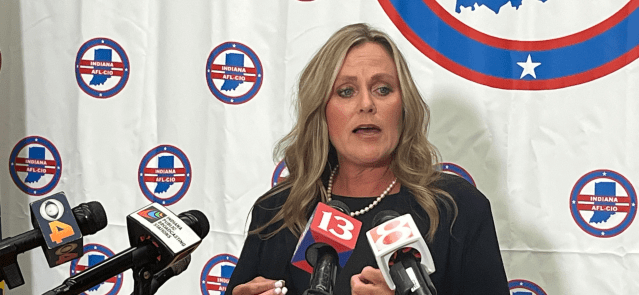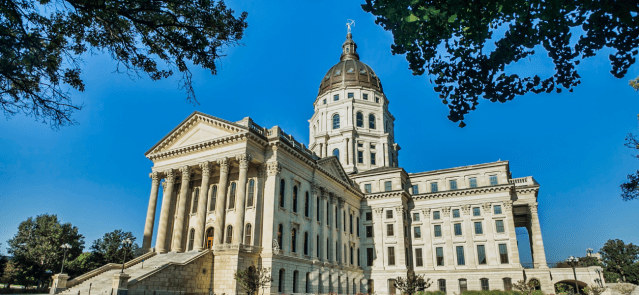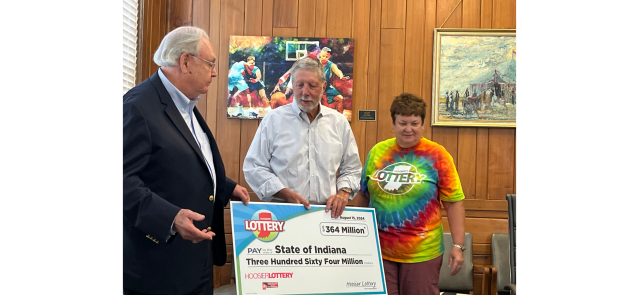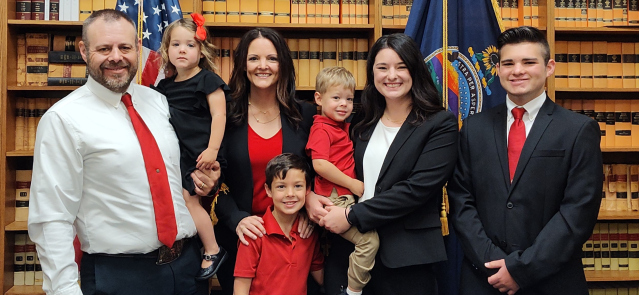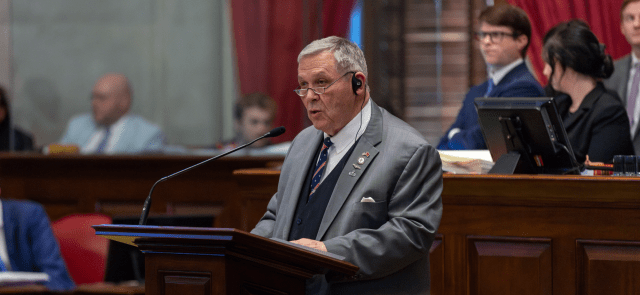Stay ahead of the curve as a political insider with deep policy analysis, daily briefings and policy-shaping tools.
Request a DemoState legislator Willoughby buying ads critical of Harris
Ads opposing Vice President Kamala Harris’s presidential bid are running nationally featuring Willoughby speaking as a registered nurse in opposition to Harris. “I’ve seen first-hand the damage that Kamala Harris caused as our country’s border Czar. Hospitals everywhere are overwhelmed and American patients are paying the price. My patients are covering the health care costs for people here illegally while their own care is jeopardized.” The ads are paid for by the conservative Preserve America PAC that was founded during former President Donald Trump’s 2020 reelection campaign. The ad doesn’t disclose that Willoughby was appointed as a Republican state legislator in Arizona and is now running for the House in LD13. One of Willoughby’s Democratic opponents, Nicholas Gonzales, spoke about the district’s current representation during a Democratic Legislative Campaign Committee press conference Thursday morning. “The representation in my community is not serving the people of my community,” Gonzales said. “They certainly aren’t focused on the best interests of Arizona and the East Valley.” Willoughby is a registered nurse in Arizona and was the chief nursing officer at Exceptional Community Hospital-Maricopa before she was appointed to the legislature. She has received support from health care PACs, including the Arizona Hospital and Healthcare Association, the Arizona Nurses Association, the Arizona Medical Political Action Committee and Pfizer’s PAC, according to campaign finance reports.
National Democratic committee back Arizona legislative candidates
SoS, state officials certify primary election results
McCormick rolls out property tax relief plan
Democratic gubernatorial nominee Jennifer McCormick on Thursday released a property tax relief plan with six policy proposals previously featured in discarded bills from recent years, including some authored by Republicans.
The amalgamation of ideas creates several indirect and direct ways of mitigating property tax bill increases, McCormick said during a Thursday news conference.
“You can’t look at one tax without looking at everything because of the ripple effect, and it would be really irresponsible,” McCormick told reporters.
She said the campaign took a “bipartisan approach” when crafting the plan but that she had not spoken with the Republicans tied to the rejected bills. However, McCormick did credit the authors — Rep. Christopher Judy, R-Fort Wayne, Sens. Travis Holdman, R-Markle, and Brian Buchanan, R-Lebanon — along with Sen. Fady Qaddoura, D-Indianapolis, for the “good ideas.”
McCormick’s plan calls for:
- capping annual property tax bill increases at 10% by issuing refundable tax credits to affected homeowners (the proposal excludes school district referendums)
- increasing the maximum homeowner property tax deduction to $3,500 from $2,500
- increasing state and local income tax exemptions to $2,500 from $1,000
- increasing the renters income tax deduction to $4,000 per year from $3,000 per year
In addition, McCormick would bolster deductions for disabled veterans by increasing the cap on assessed value to $350,000 from $240,000 and expanding qualifications.
She also aims to help seniors by increasing income thresholds for Hoosiers 66 and older. Under her plan, they could receive deductions if they make up to $40,000 as an individual or $50,000 as a household with joint returns and have an assessed value of real property up to $300,000. (The income thresholds for the group are currently set at $30,000, $40,000 and $200,000, respectively.)
Together, McCormick said the proposals would save Hoosiers about $600 million, citing fiscal impact statements the nonpartisan Legislative Services Agency previously prepared for the bills. (The campaign did not specify what the projected savings would be in future years.)
McCormick envisions the state covering most of the cost. She expressed an interest in shielding local units of government, businesses and farmers from the brunt of the hit. Yet she acknowledged local units of government would be negatively impacted, losing about $175 million, according to her campaign’s analysis of Legislative Services Agency fiscal impact statements.
McCormick said she would not “take a lot of this” out of the state’s surplus. Instead, she said most of the money would come from the state’s budget, but she did not specify from what line items. Asked about the cost of her other campaign initiatives, the Democratic candidate said it would still be possible to prioritize property tax relief while also raising teacher salaries and implementing other changes.
“There is wiggle room in that budget,” McCormick said.
For weeks, McCormick teased a plan that would contain the approximate fiscal impact on the state and local governments.
“Watching the Braun/Beckwith plan come out without a fiscal impact to it was quite alarming,” McCormick said.
Braun revised his property tax relief plan so that “all Hoosier homeowners’ tax bills will be reset to the lower of their 2021 tax bill” or a new bill with greater homestead deductions. Braun’s campaign has not released calculations on how much his proposal would reduce property tax collections. The campaign also hasn’t posed possible replacements for potentially hundreds of millions in revenue declines for public school districts and local governments, which receive more than 90% of property tax revenue.
“Democrat Jennifer McCormick is a tax-and-spend liberal, and her plan does nothing to tackle the property tax pain Hoosiers are feeling from the inflation crisis created by Democrats that McCormick endorsed: Joe Biden and Kamala Harris,” U.S. Sen. Mike Braun, the Republican gubernatorial nominee, said in a statement to State Affairs. “My bold property tax plan will give Hoosier homeowners immediate property tax relief by resetting bills to 2021 pre-Biden/Harris inflation levels.”
Libertarian gubernatorial candidate Donald Rainwater has proposed capping property taxes at 1% of a property’s purchase price for a maximum of seven years. He said his plan would end “perpetual property taxes.” Republicans have described the plan as infeasible.
The Rainwater campaign did not immediately respond to a State Affairs request for comment.
Total property tax bills on owner-occupied homes increased statewide by 9% in 2021, 9.2% in 2022 and 16.7% in 2023, according to a Legislative Services Agency report.
McCormick previously said her plan would factor in the wishes of the Indiana General Assembly, whose State and Local Tax Review Task Force continues to examine the state and local tax structure, including property taxes, ahead of the new legislative session.
Contact Jarred Meeks on X @jarredsmeeks or email him at [email protected].
Kansas pays $50K to settle transgender employee’s discrimination lawsuit against Highway Patrol
Kansas will pay $50,000 to settle a lawsuit by a former Kansas Highway Patrol employee who claimed he was fired for being transgender.
The State Finance Council on Thursday unanimously approved the agreement after a 15-minute executive session.
Attorney General Kris Kobach made the request of the council to settle Dawes v. State of Kansas after a federal judge ruled this spring that the sex discrimination lawsuit could move forward to trial.
The dispute centered on what led to the highway patrol firing William Dawes Jr. in July 2022.
Dawes, who is referred to as he/him throughout court documents, met with Human Resources Director Shellbie Blodgett to discuss the process for Dawes to transition from a male to a female identity at work.
Dawes, who started as a civilian employee at the agency headquarters in March 2021, said in his lawsuit that he ultimately was fired because of this. But the highway patrol responded by saying an inappropriate email to a female co-worker started the path to Dawes’ termination.
On June 6, 2022, Dawes sent an email to the co-worker that said she looked “absolutely amazing.”
“Please don’t ever stop expressing yourself. It is beautiful for me to see a woman so comfortable expressing her femininity,” the email said. “I absolutely LOVE your heels, BTW…I’m jealous! (Please know that I’m honestly not flirting with you…although if I were 30 years younger, I might seriously consider that option, lol. I find you inspirational, and I wanted you to know.)”
In a deposition, Dawes said he attempted to discuss the email with the co-worker after having second thoughts, but she was speaking with another employee.
The co-worker reported to Capt. Mitchell Clark that Dawes made her uncomfortable with the email and also said Dawes told her a month prior that he appreciated a woman wearing heels and pantyhose and how nice it was to see a woman taking care of herself.
The highway patrol placed Dawes on administrative leave as it conducted a sexual harassment investigation. Dawes initially refused to interview with an investigator without counsel, but he participated in another scheduled interview three days later.
The highway patrol later fired Dawes for failing to participate in the initial interview.
In April, U.S. District Judge John Broomes denied the state’s motion for summary judgment, ruling that Dawes met the proper requirements to move forward with a trial.
Bromes wrote that Dawes raised “a genuine issue of fact” whether the highway patrol’s termination was pretextual since then-Kansas Highway Patrol Superintendent Herman Jones asserted in a deposition that the initial interview refusal was the sole reason for Dawes’ firing.
“To claim that Plaintiff’s failure to answer questions or cooperate in the interview process was the reason for his termination when he cured that failure three days later is somewhat illogical,” he wrote.
Bryan Richardson is the managing editor at State Affairs Pro Kansas/Hawver’s Capitol Report. Reach him at [email protected] or on X @RichInNews.
Hoosier Lottery profit steady even with scratch-off ticket decline
The Hoosier Lottery just missed topping its best revenue mark this past year despite seeing another drop in sales of scratch-off tickets that make up the bulk of its income.
Lottery officials announced Thursday that $364 million in profits was being transferred to the state government from the fiscal year that ended June 30.
That profit came on $1.744 billion in ticket sales, a total of about $2 million, or 0.1%, less than the previous year.
The $364 million transfer to the state would have grown to the lottery’s second-highest ever if the State Lottery Commission had not decided to spend $9 million on the purchase of its headquarters building.
Breakdown on sales and profit
The lottery saw steady revenue for the year even with a 2.1% decline in scratch-off ticket sales, which make up nearly three-quarters of its income, officials said during a State Lottery Commission meeting.
That decline was offset by a 4% sales jump for its three big jackpot games — Mega Millions, Powerball and the Hoosier Lotto — and a 7% sales increase for non-jackpot draw games.
Hoosier Lottery Executive Director Sarah Taylor said the economy plays a role in scratch-off ticket sales as some people feel they don’t have as much disposable income to spend.
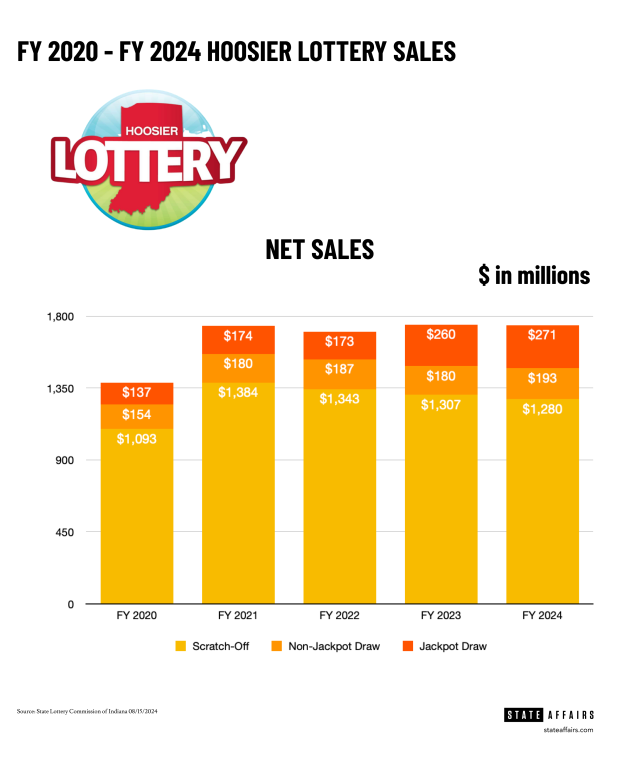
The lottery aims to introduce about three new scratch-off games each month in order to keep ticket buyers interested, along with special games such as recent ones tied in with the movie “Jaws” and the summer Olympics, Taylor said.
The big jackpot ticket sales were boosted during the past year by five jackpots that topped $1 billion spread over 13 drawings.
But Taylor said the sales and enthusiasm for those $1 billion jackpots is fading.
“It used to be you would see a huge spike when it would go to the billion,” Taylor told State Affairs. Now, our sales take a longer path. As the jackpot is rising, we’re taking a longer way to get to the numbers we got the first time or the second time or the third time. That’s natural.”
This was the third straight year of declines in scratch-off tickets sales. That revenue has dropped about $100 million, or 7.5%, since it peaked during 2020-21 when sales spiked during the early months of the COVID-19 pandemic.
The company hired to run much of the Hoosier Lottery’s operations — IGT Indiana — is receiving a $19.9 million incentive payment for exceeding minimum net income levels for the year. That is the maximum level it can receive and is just 0.4% from last year.
Online lottery push?
Talk about Indiana following some other states and allowing online lottery games — and perhaps online casino gaming — has lingered at the Statehouse over several years without action by the Legislatures.
Lottery Commission Chair William Zielke alluded to that topic as he congratulated staffers of the Hoosier Lottery and its contractors for the sales performance.
“As we still work with a pretty mature product line and with now still limited channels of distribution, I think the ability to work with our retailers and be creative on games is really what carries the day for us,” Zielke said.
Taylor said lottery officials would “wait and see” whether the Legislature takes up the issue next year.
More states are allowing online lottery sales and that has drawn in new players, she said.
“There’s at least 12 or 13 jurisdictions now that have a footprint in the i-lottery world,” Taylor said. “Consumers have changed, but we know from the data that traditional brick-and-mortar retail still rises in those jurisdictions.”
Headquarters building purchase
The lottery’s state transfer was down from last year’s $370 million, but would have topped that mark without its $9 million purchase of its downtown Indianapolis headquarters building from Indiana University Health.
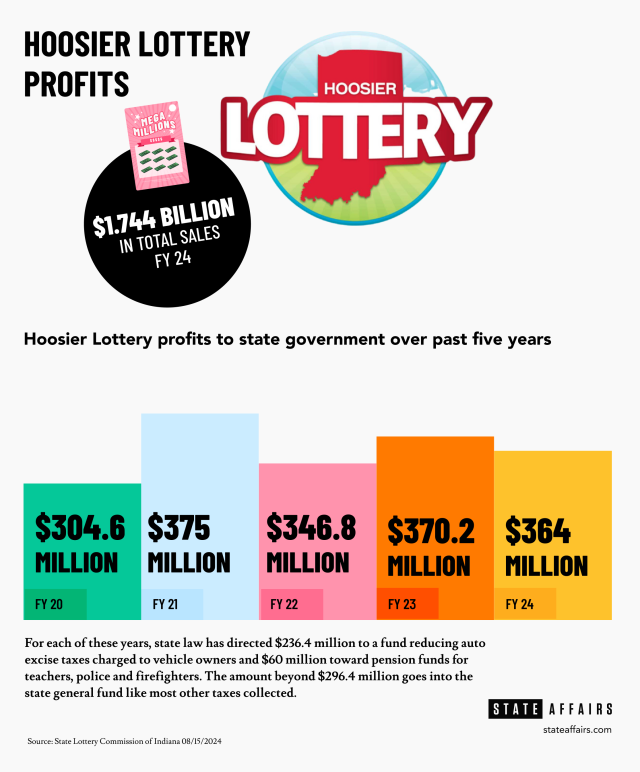
Taylor said the lottery staff continues to share the building with tenants including the state Horse Racing Commission and a private business.
The Hoosier Lottery’s lease was nearing an end when IU Health officials brought up selling the building, she said.
“We put all the numbers together and added in the move cost and rental cost,” Taylor said. “It just made sense.”
Where the money goes
Under state law, about $236 million from the lottery goes into the motor vehicle excise tax replacement account, which reduces the auto excise taxes that vehicle owners must pay. Roughly two-thirds of auto excise tax revenue is distributed to local government units, with the remainder going to the state government.
The lottery commission also must transfer $60 million a year toward state pension funds for teachers, police officers and firefighters.
Any additional profit — about $68 million from the 2023-24 fiscal year — goes into the state government’s general fund.
Tom Davies is a Statehouse reporter for State Affairs Pro Indiana. Reach him at [email protected] or on X at @TomDaviesIND.
Steele officially prevails in 51st House District race after final count
Megan Steele is officially the Republican nominee in the 51st House District after counties completed their canvassing Thursday morning.
Steele ultimately won the primary race against Eli Kormanik by 22 votes — 1,572 to 1,550 — according to final results provided by the district’s three counties. She picked up an additional 19 votes from provisional ballots, according to the Pottawatomie County Clerk’s Office, while Kormanik picked up nine.
Riley County did not have any valid provisional ballots in the 51st District race. Both Riley and Pottawatomie finished canvassing votes Thursday. The wait to confirm her victory was “a little nerve-wracking,” Steele said, adding the past few days have been stressful.
“At the same time, I had a really strong sense of peace,” she said. “I know that’s God [who] was giving me the peace and the faith in just knowing that if it’s supposed to be, it will be.”
On election night, Steele led by 28 votes, but her margin sat at just 12 after Wabaunsee County finished its final count on Monday. The narrow margin triggered an automatic close-race audit, a process the Secretary of State’s Office said has been completed.
After the audit confirmed the election night numbers, Steele said she was confident in the results.
“I trust the election process and the votes,” she said.
Kormanik said he wished Steele “the best of luck” in the general election, where she’ll take on Democrat Linda Morse, a former Manhattan mayor. Steele’s already planning campaign events ahead of that contest, including one Saturday morning with the Riley County Republican Party.
“I am going to continue to strengthen the relationships [with] the community leaders and all community members that I met over the course of the past three months and continue to build a strong relationship and a partnership with them,” Steele said. “That’s pretty much my campaign, that we have to partner together.”
The 51st House District is open after incumbent Rep. Kenny Titus, R-Manhattan, opted to run for a Senate seat.
Brett Stover is a Statehouse reporter at State Affairs Pro Kansas/Hawver’s Capitol Report. Reach him at [email protected] or on X @BrettStoverKS.
Ragan tells colleagues he plans to challenge Republican primary loss
Republican Rep. John Ragan is telling colleagues he will contest his 258-vote defeat by primary challenger Rick Scarbrough in Anderson County.
Ragan’s camp had criticized Scarbrough during the campaign for once being a Democrat before switching to the Republican Party. The attacks didn’t appear to resonate among voters, as Scarbrough prevailed by 4 percent points.
The Tennessee Journal has learned Ragan has contacted House Republicans and donors to tell them not to support Scarbrough because the incumbent expects to be back.
It wouldn’t be the first time a losing primary candidate has sought to overturn results based on crossover voting. But such efforts have not been successful in any recent elections — even ones much closer than the Ragan-Scarbrough contest in District 33.
Knoxville real estate agent Gina Oster filed a formal challenge of her 99-vote loss to businessman Eddie Mannis in the Republican primary to succeed retiring state Rep. Martin Daniel of Knoxville in 2020. Oster contended crossover voting by Democrats exceeded Mannis’ margin of victory and that her campaign “has been presented proof” her opponent actively solicited support from non-Republicans. The GOP’s executive committee, which under state law makes up the primary board, rejected the challenge.
“This is how you lose a seat to Democrats in Knoxville, by doing foolishness like this,” House GOP Caucus Chair Jeremy Faison said at the time. “This is how Democrats act, not Republicans.”
Former Rep. Tony Shipley, R-Kingsport, demanded primaries be closed after surviving a 2012 challenge by just 10 votes. He was defeated two years later by current Rep. Bud Hulsey of Bristol in the GOP primary. Fellow former state Rep. Jim Cobb of Spring City similarly blamed crossover voting for his 105-vote primary defeat in 2012 at the hands of Ron Travis of Dayton, whom he denounced three years later as “a Democrat.” In their 2014 rematch in which Travis trounced Cobb 6,726 to 3,602.
A primary challenge that succeeded — to howls of GOP protests — was when Tennessee Democrats invalidated incumbent Sen. Rosalind Kurita’s narrow primary win in 2008 after she had been a key vote in favor of Sen. Ron Ramsey of Blountville becoming the chamber’s first Republican speaker since Reconstruction.
But the technical justification for declaring her 19-vote primary win “incurably uncertain” included (1) voters had been misdirected about which party’s primary to vote in, and (2) Kurita had violated the 100-foot boundary to enter a school building where ballots were being cast. Kurita testif ied she had gone into the school building to use a restroom and never spoke to anyone near voting machines. Her lawyer scoffed at the complaint as “Pottygate,” but the party’s executive committee still voted to revoke her nomination.

